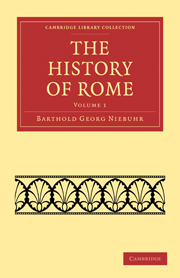Book contents
- Frontmatter
- TO HIS MAJESTY FREDERIC WILLIAM THE THIRD, KING OF PRUSSIA
- PREFACE
- Contents
- INTRODUCTION
- ANCIENT ITALY
- THE PRELIMINARY HISTORY OF ROME
- ROME
- Various Traditions about the Origin of the City
- Romulus and Numa
- Beginning and Nature of the Earliest History
- The Era from the Foundation of the City
- On the Secular Cycle
- The Beginning of Rome and its Earliest Tribes
- The Patrician Houses and the Curies
- The Senate, the Interrexes, and the Kings
- Tullus Hostilius and Ancus
- The Lay of L. Tarquinius Priscus and Servius Tullius
- Examination of the Stories of L. Tarquinius and Servius Tullius
- The Completion of the City of Rome
- The Six Equestrian Centuries
- The Commonalty and the Plebeian Tribes
- The Centuries
- L. Tarquinius the Tyrant and the Banishment of the Tarquins
- Commentary on the Story of the Last Tarquinius
- The Beginning of the Republic and the Treaty with Carthage
- The War with Porsenna
- The Period down to the Death of Tarquinius
- The Dictatorship
- The Commonalty before the Secession, and the Nexi
Various Traditions about the Origin of the City
Published online by Cambridge University Press: 05 June 2011
- Frontmatter
- TO HIS MAJESTY FREDERIC WILLIAM THE THIRD, KING OF PRUSSIA
- PREFACE
- Contents
- INTRODUCTION
- ANCIENT ITALY
- THE PRELIMINARY HISTORY OF ROME
- ROME
- Various Traditions about the Origin of the City
- Romulus and Numa
- Beginning and Nature of the Earliest History
- The Era from the Foundation of the City
- On the Secular Cycle
- The Beginning of Rome and its Earliest Tribes
- The Patrician Houses and the Curies
- The Senate, the Interrexes, and the Kings
- Tullus Hostilius and Ancus
- The Lay of L. Tarquinius Priscus and Servius Tullius
- Examination of the Stories of L. Tarquinius and Servius Tullius
- The Completion of the City of Rome
- The Six Equestrian Centuries
- The Commonalty and the Plebeian Tribes
- The Centuries
- L. Tarquinius the Tyrant and the Banishment of the Tarquins
- Commentary on the Story of the Last Tarquinius
- The Beginning of the Republic and the Treaty with Carthage
- The War with Porsenna
- The Period down to the Death of Tarquinius
- The Dictatorship
- The Commonalty before the Secession, and the Nexi
Summary
Among all the Greek cities built after the return of the Heraclidæ, there was none so insignificant, that Ephorus, and the writers who after him introduced the origins of cities into general history, would have been unable to state specifically and with sufficient certainty the people from which the colony had issued, and the founders who led it and gave laws to it; in far the most cases they also fixed the epoch of the foundation. When Rome was founded, which yet is supposed to be more recent than perhaps the greater part of those Greek cities; from what people the eternal city originally arose; is precisely what we do not know. But it is no less suited to the eternity of Rome for its roots to lose themselves in infinity, than what the poets sang of the rearing and deification of Romulus, befits the majesty of the city. A god, or no one, must have founded it.
Now while I acknowledge this with a love, the sincerity of which none but a bigot, insincere himself, could seek to call in question, while I allow the heart and the imagination their full rights; I at the same time assert the claims of the reason, to take nothing as historical which cannot be historical; and, without refusing to the noble tradition its place at the threshold of the history, to inquire whether it can be in any degree ascertained to what people the original Romans may have belonged, and what changes attended the rise of that state which, when the light of historical truth begins to dawn, is Rome.
- Type
- Chapter
- Information
- The History of Rome , pp. 173 - 183Publisher: Cambridge University PressPrint publication year: 2010First published in: 1828



